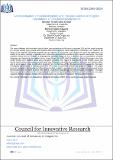An investigation of partial meaning and non-equivalence in English translations of Ekegusii kinship terms

View/
Publication Date
2015Author
Deborah Nyanchama Oyioka, Benson Oduor Ojwang, David Ogoti Ongarora
Metadata
Show full item recordAbstract/
The main challenge that translators face is that of non-equivalence as the source language (SL) and the target language
(TL) almost always have cultural and linguistic differences (organize words differently). Accordingly, one needs to be
aware of the linguistic differences between the two cultures. A group uses a set of terms to name the people they are
related to by blood, marriage or adoption which should be recognized by members of the speech community. This study
explores kinship terms in Ekegusii, a language that has been coded as E42 in Guthrie's (1971) classification of Bantu
languages and belongs to the interlacustrine zones, namely D and E. Both Ekegusii and English languages have their
unique kinship term systems which pose translation problems with regard to equivalence. Unlike English nouns that
denote family relations in a pretty straightforward way, Ekegusii’s way of addressing family members and relatives differs
and to some degree it may be difficult to those who are not familiar with the Ekegusii culture. Consequently, this paper
investigates the problem of non-equivalence at word level in translation between Ekegusii and English. The paper
presents background knowledge and different approaches related to non-equivalence. Subsequently, conceptual kinship
terminologies are contrasted to prove that there is a significant linguistic gap between Ekegusii and English. The paper
then proposes a classification of non-equivalence at word level based on Mona Baker’s point of view. Finally, the paper
suggests effective strategies to deal with non-equivalence at word level in translation of Ekegusii kinship terms.
